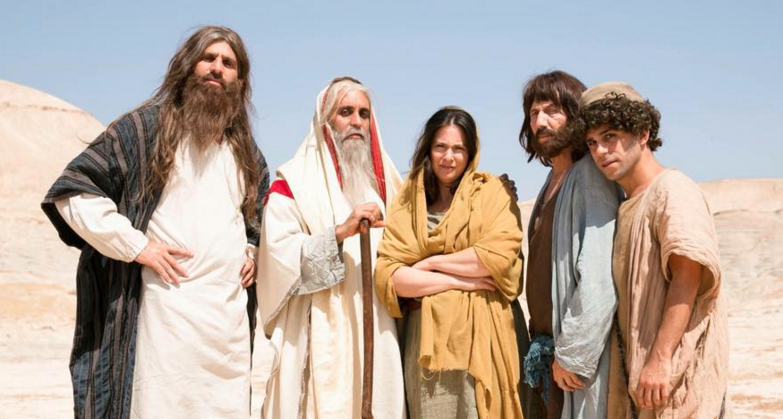
Cast picture of the Israeli hit tv show “Hayehudim Ba’im.” Photo via Facebook.
Satire as a Hebrew Genre
Satirical parody of traditional Jewish texts hardly constitutes a new genre in Hebrew literature and culture. According to scholar Derek Penslar in Israel in History: The Jewish State in Comparative Perspective (Routledge, 2007), parody and humor about Jewish holy books were an integral part of Haskalah literature in the 19th century as well as of Jewish culture in the Zionist Yishuv from its earliest days. From newspaper columns to cabaret acts, pre-State Jews laughed at themselves and at rival groups through the medium of satire related to such Jewish books as the Bible, the Talmud and the Passover Haggadah.
According to Penslar, however, after 1948 Israeli satire became increasingly parochial and secular, focusing more on political issues of the day or on ethnic divisions in Israeli culture. Increasingly, Israeli humor became more and more removed from Jewish content and the Jewish past. “How many secular Israelis today would identify themselves, as did Yishuv parodists during the 1920s and 1930s, with Israel in Egypt, and how many would conceive of the manifold crises confronting contemporary Israel in terms of the Passover narrative?” Penslar asks woefully. “This is not solely a question of lacking textual knowledge; rather, it is a sense of distance, even alienation from the Jewish past and its creation.” (Penslar, 185)
Seven years later, however, the picture seems to be changing with Hayehudim Ba’im (The Jews are Coming), a satirical TV show, which completed its first broadcast season in January 2015, and is poised now to begin its second season in January 2016. Here is a contemporary Israeli television program, broadcast on Israel’s historic Channel 1—for many years the only TV channel in the country—devoted not to spoofing contemporary Israeli politics but to sketches that target the entire history of the Jewish people since biblical times. Here the laughs depend not on an intimate knowledge of all the ins and outs, scandals and skirmishes of Israeli politicians and its parties, but on central moments in Jewish history and culture throughout the ages. The title of the series itself marks a shift in focus, announcing, as it were, the coming home of Jews and Jewishness to Israeli humor. With Hayehudim Ba’im, Israeli TV satire of the Jewish Holy Book has returned but this time, better and funnier than ever.
To be sure, Hayehudim Haba’im is not the first Israeli skit show to feature satirical skits on the Holy Book. Nikui Rosh, a famous post-1973 sketch program, featured an unforgettable bit, in which Moses flees the site of the burning bush after God tells him to take off his shoes, because it was simply too hot to stand barefoot in the hot desert sand.
Likewise, Hahamishiya Hakamerit, which ran on Channel 1 from 1993-1997, featured a celebrated spoof of the story of the Binding of Isaac, replete with a candid camera host and a bikini-clad “angel” as Abraham’s prize.
More recently in 2010, the cast of the satirical news show Eretz nehederet released the film Zohi sdom, an extended lampoon of the biblical story of the destruction of Sodom (Genesis 19).
Irreverence Towards All Sides
Whereas material based on biblical and other Jewish historical and textual materials was the exception rather than the rule of these other satirical comedy shows, Hayehudim Ba’im has made the business of mocking sacred Jewish stories, hallowed personalities, and canonical events for the purpose of broader social criticism its comic bread and butter. No sacred cow is too holy to escape the razor sharp blade of its wit, beginning with the very first skit of Season 1, a send-up the various inconsistencies and hypocrisies of the Ten Commandments. A stuttering insecure Moses gives the commandments, only to be besieged by questions from the Israelites about each and every one, most trenchantly the prohibition against murder, given the biblical mandate to wipe out the Amalekites and other indigenous groups.
While the irreverence of Hayehudim Ba’im might be viewed by some as virulently anti-religious, the show clearly demonstrates an investment in the Jewish past that is unprecedented in recent Israeli pop-culture. The secular-religious divide in Israel used to be an established, unimpeachable fact. But the rise over the past decade of secular batei-midrash (Houses of Study) and related organizations committed to the idea of secular Israeli Judaism have begun to narrow and complicate the schism between secular and religious life in Israel, pointing to new ways to be an engaged and learned Israeli Jew. The mission statement of one such new organization, Harabbanut hahilonit beYisrael (The Secular Israeli Rabbinate), insists that to be a secular Jew means being part of a dynamic, ever-renewing, forward-looking community, with a three-thousand year-old historical tradition.
Deeply rooted in this history, as well as in the best traditions of Jewish humor, Hayehudim Ba’im is yet another expression of this conviction. As could be expected, the show has garnered no small measure of criticism from the religious and political right. Skits like the mock advertisement in Season 1 Episode 5 promoting “the Agudah lemilhamah be’Elohium” (The Society for War Against God), are not calculated to curry favor with the ultra-Orthodox.
The brilliance of this mock-advertisement, however, is that all sides come under satirical attack. Simplistic traditional theologies may not satisfy those modern Jews looking for explanations as to how a supposedly benevolent God can allow great natural disasters to overtake innocent people all over the world. But the secular scientists featured at the end of this sketch, who hubristically proclaim their intent to wage war against God, similarly underestimate the enduring spiritual needs even of secular Jews. Here come the new TV Jews to bring comic relief to their spiritual woes.
 Wendy Zierler serves as the Sigmund Falk Professor of Modern Jewish Literature and Feminist Studies at the New York campus of Hebrew Union College-Jewish Institute of Religion. Her books include And Rachel Stole the Idols: The Emergence of Modern Hebrew Women’s Writing (Wayne State University Press, 2004); Behikansi Atah (The Collected Writings of Hava Shapiro, Hebrew) edited with Carole B. Balin (Resling Press, 2008); and To Tread on New Ground: Selected Hebrew Writings of Hava Shapiro (1878-1943), translated by Wendy Zierler, edited with Carole B. Balin (Wayne State University Press, 2014).
Wendy Zierler serves as the Sigmund Falk Professor of Modern Jewish Literature and Feminist Studies at the New York campus of Hebrew Union College-Jewish Institute of Religion. Her books include And Rachel Stole the Idols: The Emergence of Modern Hebrew Women’s Writing (Wayne State University Press, 2004); Behikansi Atah (The Collected Writings of Hava Shapiro, Hebrew) edited with Carole B. Balin (Resling Press, 2008); and To Tread on New Ground: Selected Hebrew Writings of Hava Shapiro (1878-1943), translated by Wendy Zierler, edited with Carole B. Balin (Wayne State University Press, 2014).
Links for Further Exploration
- Hebrew and the Humanities: Present Tense symposium homepage
- Click here to read all posts in the “How We Connect to Hebrew” series written by symposium participants






